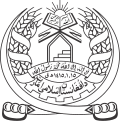 |
|---|
The attorney general of Afghanistan was a legal post in the government of Afghanistan.
Contents
Under the 2004 Constitution of Afghanistan, the attorney general was the government's chief legal advisor and was also the nation's top prosecutor. After taking over the government in 2021, the Taliban transferred responsibility for the prosecution of crimes to the country's judiciary. The Taliban appointed an acting attorney general, Shamsulldin Shariati, but it was unclear what his responsibilities were. [1]
In July 2023, the Attorney General's Office was abolished by a decree of Supreme Leader Hibatullah Akhundzada and was replaced by the High Directorate of Supervision and Prosecution of Decrees and Orders. [2]